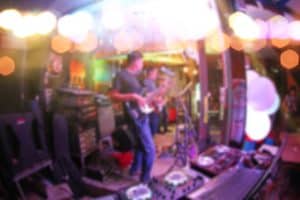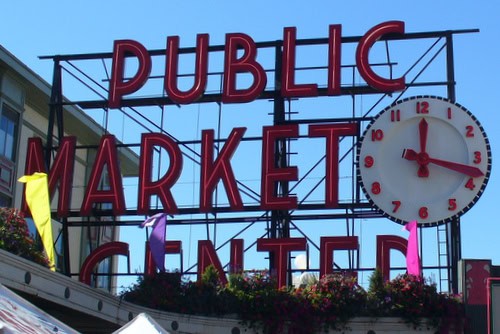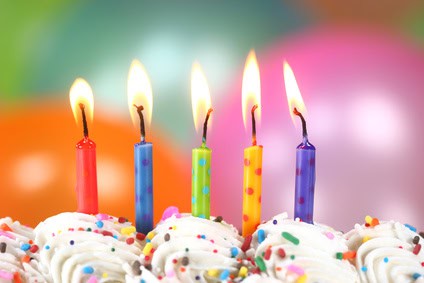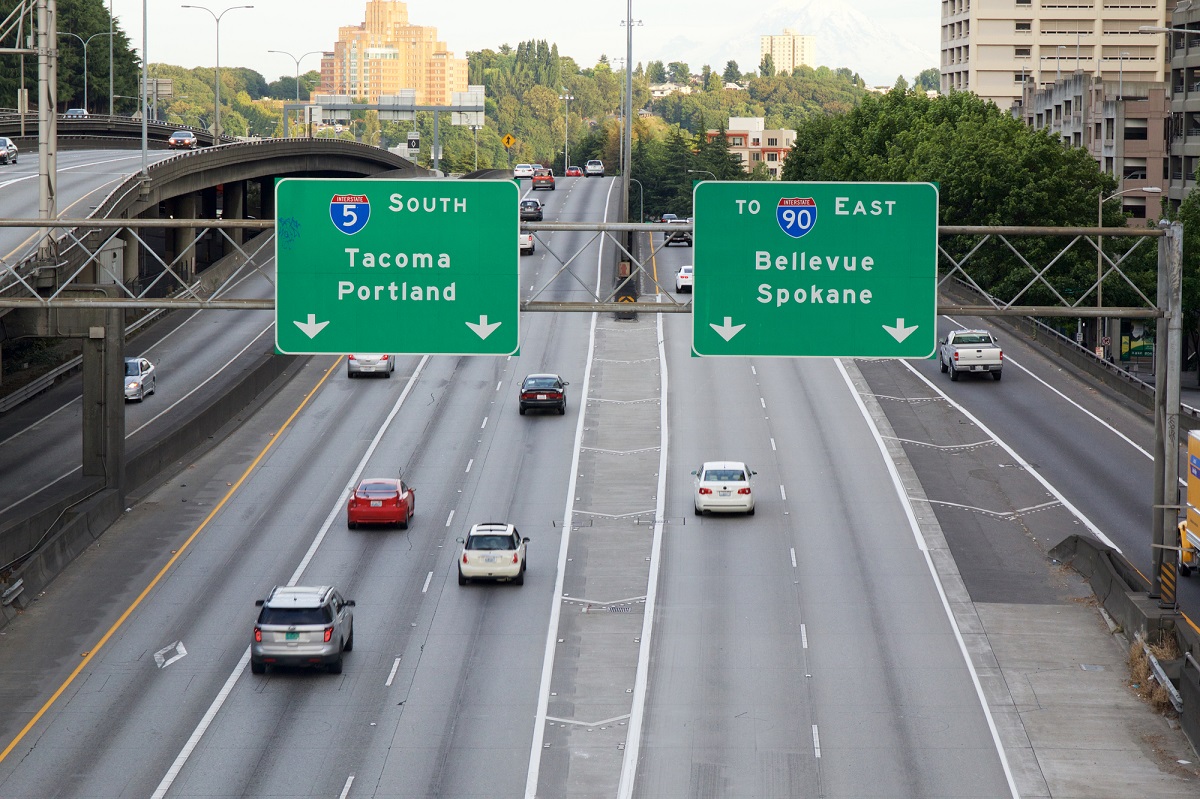Here’s a list of Japanese and Chinese gardens in the Puget Sound region. Most of these Puget Sound gardens offer FREE admission. The Seattle Japanese Garden at the Washington Park Arboretum is the most well-known. However, there are at least 10 more you can visit, from Everett to Tacoma and Bellevue. They are arranged roughly north to south throughout the region.
The two best times of the year to visit any of these gardens is spring and fall. In spring, Asian gardens showcase blossoming trees and flowers. In fall, they are ablaze with color from maple trees preparing for a winter rest. At other times of the year, there are often festivals and other events celebrating different aspects of Chinese or Japanese culture.
(Listed below, the Japanese and Chinese gardens are arranged roughly north to south in the Puget Sound region.)
Japanese Maple Grove at Evergreen Arboretum in Everett
Evergreen Arboretum & Gardens is located on 3½ acres in American Legion Memorial Park. The Arboretum contains 11 themed gardens, including the Maple Grove. These gardens are maintained by volunteers, with support from the City of Everett Parks Department.
Find the Maple Grove midway through the Arboretum, between the Woodland Garden and the Backyard Garden. It features over 700 Japanese Maple trees and offers seasonal displays, including spring foliage, fall color, and winter textural interest. Monthly classes by local gardening experts are FREE for members and $10 for non-members. Individual membership begins at $25/year.
Visiting Evergreen Arboretum
- Location: American Legion Memorial Park, 145 Alverson Blvd, Everett, WA 98201.
- Hours: daily from dawn to dusk
- Admission: FREE
- Parking: FREE
- Website: Japanese Maple Grove — Evergreen Arboretum and Gardens and Legion Memorial Park (everettwa.gov)
Japanese Garden at Bloedel Reserve on Bainbridge Island
Bloedel Reserve began as the private home of environmentalist-cum-timber-heir Prentice Bloedel and his wife, Virginia. In 1956, the Bloedels hired Seattle’s Fujitaro Kubota to design a Japanese Garden on their recently acquired land, making it one of the first gardens on the property.
In 1961, a Guest House designed by Paul Hayden Kirk was added to the Japanese garden. The design combined elements of a traditional teahouse and a Pacific Northwest Native American longhouse. Today, the reserve is a public garden and forest reserve comprised of 150 acres and 23 distinct landscapes.
The Japanese Garden at Bloedel Reserve has been named one of the top ten Japanese Gardens in the country. Other focal points of the Japanese Garden include a pond, rocks, and of course plantings thoughtfully placed by Kubota and his sons.
Visiting Bloedel Reserve
- Location: Bloedel Reserve, 7571 NE Dolphin Drive, Bainbridge Island, WA 98110
- Hours: Tuesday-Sunday year-round; hours vary by season
- Admission: Timed tickets required, no walk-ups. Prices: $22/adult, $15/senior and military, $10/ages 13-18 and college students with ID, $5/children age 5-12, children under 5 are free.
- PWYC admission day: 1st Wednesday is pay-what-you-can. More info: Welcome Wednesdays at Bloedel Reserve
- Parking: FREE
- Website: Bloedel Reserve | One of North America’s 10 Best Botanical Gardens
Japanese Garden at Washington Park Arboretum in Seattle
The Seattle Japanese Garden is one of the most widely known Japanese gardens in the United States. The garden first opened in 1960 and was designed around a teahouse by Japanese master designers Kiyoshi Inoshita and Juki Iida. The original teahouse was destroyed in a fire in 1973 but reconstructed several years later from the original plans, which were in Japanese. The new teahouse was named Shoseian, meaning ‘Arbor of the Murmuring Pines’. The garden has two parts: a formal stroll-through garden (north) and an informal woodland (south). Some elements of the garden include gates, a pond or small lake, a wooden bridge, a meadow, a waterfall, a stone peninsula, and of course many beautiful trees and plantings.
Free tours are available with the price of admission and are offered several days a week. You can also take a self-guided tour. Simply wander along the garden’s pathways to stroll past koi-filled ponds and over bridges to enjoy the many design elements and serene nature of this urban retreat. To enhance any visit, a variety of events, classes, and educational opportunities are available throughout the year.
For a modest fee, guests can participate in an authentic Japanese Tea Ceremony–called Chado or The Way of Tea–in the Shoseian Tea House. This tea ceremony has been a cultural tradition in Japan since the 15th Century.
Visiting Seattle Japanese Garden
- Location: 1075 Lake Washington Boulevard East, Seattle, WA 98112. Located within the Washington Park Arboretum at the southwest end.
- Hours: open March-November, Tuesday-Sunday, with seasonal changes in hours. The garden is closed in winter, December-February. There is always a special opening event in March.
- Admission: $10/Adults (18-64), $6/seniors, youth (6-17), student, military. Children 0-5: FREE.
- Parking: FREE
- Website: Seattle Japanese Garden
Yao Garden at Bellevue Botanical Garden
Bellevue Botanical Garden (BBG) sits on property that was gifted to the city in 1981 for use as a public park. BBG is comprised of many small gardens spread over 53 acres. Each garden has a specific focus. You’ll find the Yao Garden situated near the south end of the parking lot. It was created to honor Bellevue’s sister city, Yao, Japan. The garden is a blend of Pacific Rim influences: maples and Columbia River basalt; native ground covers and Japanese lanterns; viburnums with azaleas and rhododendrons.
BBG annual events include a holiday light display, Mother’s Day event, and art exhibits, in addition to art and gardening classes on a variety of topics. Most events are FREE or low-cost.
Visiting Bellevue Botanical Garden
- Location: Bellevue Botanical Gardens, 12001 Main Street, Bellevue, WA 98005
- Hours: daily dawn to dusk
- Admission: FREE, donations accepted
- Free tour: 1-hour docent-led tour Saturday-Sunday at Noon from April-October. Donation suggested. Reservation not required. More info: Tours – Bellevue Botanical Garden
- Parking: FREE
- Website: The Gardens – Bellevue Botanical Garden and Bellevue Botanical Garden (bellevuebotanical.org)
Seattle University Kubota Gardens
The Seattle University Campus on Seattle’s First Hill boasts several gardens throughout their campus, designed and created by Fugitaro Kubota in the 1950s and 1960s.
Visiting Seattle University gardens
- Location: Seattle University, 901 12th Avenue, Seattle, WA 98122. The main campus is located between Broadway and 12th Avenue, from E Madison St to E Jefferson St.
- Hours: Open daily
- Admission: FREE
- Parking: Paid parking, available on campus in visitor lots or nearby on city streets
- Website: Campus Map | Seattle University
About the Kubota Japanese Memorial Garden at Seattle U
Fujitaro Kubota in 2004. Fujitaro funded, designed, and built the Kubota Garden in south Seattle; he died in 1973 at the age of 94. His grandson, Allen Kubota, designed and installed the Kubota Japanese Memorial Garden at Seattle U in 2004. The garden is located at 11th & Spring St, east of Hunthausen Hall.
The Kubota memorial garden at Seattle U honors the Japanese Americans incarcerated in camps during WWII, including Allen’s grandfather. While incarcerated at Camp Minidoka, Fugitaro Kubota landscaped a garden at the entrance. Today, you can visit the Minidoka National Historic Site, managed by the National Park Service.
Chinese Garden at South Seattle College
A hidden gem, the Chinese Garden at South Seattle College features stunning city and mountain views from its perch high above Seattle and Elliott Bay. Visitors are immersed in the Chinese garden design elements of earth, water, stone, and agriculture. At 4.6 acres, it is one of the largest Chinese gardens outside of China.
Visiting South Seattle Chinese Garden
Depending on the season, your visit may include seasonal celebrations around peonies, bamboo, kites, tea, and other elements of Chinese culture. Some favorites include the Chinese New Year lantern festival in later winter/early spring, the Peony festival in spring, and summertime celebrations about kites. Many events are free or offered at a modest fee. Classes at the garden are also available in different aspects of traditional Chinese culture, including horticulture, art, architecture, literature, and the culinary arts. Self-guided tours are available: Seattle Chinese Garden Self-Guided Tour Brochure (PDF)
- Location: South Seattle College, 5640 16th Ave SW, Seattle, WA 98196. Located at the north entrance to the campus. Note: while the West Seattle Bridge is closed, from the north use WA-99 South/WA-509 South and from the south use WA-599 North/Hwy 99 North.
- Hours: Open year-round from dawn until dusk. The courtyard is open Tuesday-Sunday when staff is present.
- Admission: FFREE. Donations accepted.
- Parking: Paid parking in the campus visitor lot
- Website: Seattle Chinese Garden (seattlechinesegarden.org)
Kubota Garden in South Seattle
One cannot overstate the enduring legacy left by Fujitaro Kubota to the city of Seattle. He was an immigrant who single-handedly introduced Japanese garden design to the Pacific Northwest. At Kubota Garden, Fujitaro created a beautiful urban oasis that can be enjoyed by all. Begun in 1927 at his home, the Kubota’s core garden was 4.5 acres. During World War II, he was evacuated with other Japanese-Americans to the harsh prison camp, Minidoka, situated along the Washington-Idaho border. Returning to Seattle, he labored once again to rebuild his landscaping business and continued to expand the garden’s size. Fujitaro died in 1973 at the age of 94. The Kubota is family sold the garden to the City of Seattle.
The Seattle Historical Landmark is now managed by the Parks Department for public enjoyment. You can enjoy 20 acres of plantings and Japanese garden elements, including 140 varieties of maples, 30 hydrangea varieties, 9 ponds, and 2 bridges. It is one of the best gardens in the city to visit for fall foliage color. FREE self-guided tour maps are available on their website and at the garden. Guided public and private groups tours are also available. Public events are held in the gardens, many of which are FREE. Past events have included readings, tree walks, Kodo drummers, and history talks.
Visiting Kubota Garden
- Location: Kubota Garden, 10915 51st Ave S, Seattle, WA 98178
- Hours: Daily from dawn to dusk
- Admission: FREE. Donations accepted.
- Free Tour: 4th Saturday of every month at 10 a.m. Reservations are required; sign up on their website. More info: Tours – Kubota Garden Foundation.
- Parking: FREE
- Website: Kubota Garden (kubotagarden.org)
Seike Japanese Garden at Highline SeaTac Botanical Garden
A Japanese immigrant, Shinichi Seike ran an import/export business in Seattle and lived in a farmhouse on 13 acres in Des Moines with his wife Kameno, daughter Ruth, and three sons Ben, Toll, and Hal. All three sons served in the U.S. military. However, the family was imprisoned in America during World War II, along with more than 100,000 other Japanese-Americans. Fortunately, a German-American family maintained their property during their absence. Eventually, Shinichi Seike and his sons Hal and Ben opened a nursery, utilizing their horticulture degrees from Washington State University.
The Seike family built the Japanese Garden on their farm in 1961 as a memorial to their son and brother, Toll. Toll was killed in action in France while serving with the 442nd Regimental Combat Team, the most-decorated military unit in U.S. History. The family hired Shintaro Okada, a garden designer from Hiroshima, to assist with planning and construction of the classic pond-and-mountain Japanese garden design.
Impacted by the expansion of SeaTac Airport, the garden was moved to its present location in what is believed to be the largest relocation of a Japanese Garden in the United States. “The Seike Garden (DVD)“, tells the story of the Seike Japanese Garden is available through the King County Library System (Call number: DVD 712.509797 SEI).
Visiting Seike Japanese Garden
- Location: Highline SeaTac Botanical Gardens, 13735 24th Ave S, SeaTac, WA 98168
- Hours: daily dawn until dusk
- Admission: FREE
- Parking: FREE in the Community Center parking lot
- Website: Highline SeaTac Botanical Garden (highlinegarden.org)
Pacific Bonsai Museum in Federal Way
Bonsai is an Asian art form and horticultural technique that originated in China as miniature landscapes. Eventually, the techniques were adopted by the Japanese to become what today are known as “bonsai trees”. The word “bonsai” means “planted in a container”.
The museum offers a rotating display of 60 bonsai in a majestic, yet serene outdoor setting among towering evergreen trees. Exhibits change with the seasons, rotating bonsai from their collection of over 150 trees. It is one of the most diverse public collections in North America, featuring trees from China, Japan, Korea, and Taiwan, as well as the United States and Canada.
Festivals, classes, and other events are held throughout the year, including a beginner bonsai-keeping course. There is also a gift shop with online ordering.
Visiting Pacific Bonsai Museum
- Location: Pacific Bonsai Museum, 2515 S 336th St, Federal Way, WA 98001
- Hours: Tuesday-Sunday 10am-4pm
- Admission: by donation. Suggested $12/adult; accepted at the end of the exhibit.
- Parking: FREE
- Website: Pacific Bonsai Museum (pacificbonsaimuseum.org)
Japanese Garden at Point Defiance Park in Tacoma
Plants in the Japanese Garden in Tacoma include azaleas, rhododendrons, flowering cherry trees, crabapples, and pine trees accented by other design elements including a footbridge, waterfall, lanterns, and pagoda. It is a very distinct and peaceful area for you to enjoy a bit of solitude. Events are held in the pagoda from time to time.
Visiting Point Defiance Park and the Tacoma Japanese Garden
- Location: Point Defiance Park, 5400 N Pearl St, Tacoma, WA 98407.
- Hours: Open during Point Defiance hours, ½ hour before sunrise to ½ hour after dusk. Closures may occur
- Admission: FREE
- Parking: FREE, at the N Pearl St entrance, the lot to the left is closest to the Japanese Garden
- Website: Japanese Garden – Metro Parks Tacoma and Point Defiance Park (metroparkstacoma.org)
Japanese Maple Collection at Lakewold Gardens
The backbone of Lakewold’s plant collection is its collection of 800 Rhododendrons. The gardens also offer 30 Japanese maples to view, in particular, the Acer ‘Shindeshojo’—at its peak in spring. But its beauty is fleeting; if you miss it, you’ll need to return another year. Or, content yourself with 29 other trees.
Lakewold also boasts two champion trees in the Washington State Big Tree Program. Designated trees are the largest known examples of their kind, representing the maximum growth of a species:
- The Acer palmatum – Japanese Maple located near the Dog Path
- Acer palmatum ‘Atropurpureum’ – Red Japanese Maple located on Circle Drive
Visiting Lakewold Gardens
A variety of events are hosted year-round including guided walking mediation, gardening classes, and more. Animal lovers can enjoy “Dog Days” once a month when dogs are welcomed for an additional fee. Don’t miss a visit to their gift shop.
- Location: Lakewold Gardens, 12317 Gravelly Lake Dr SW, Tacoma, WA 98499
- Hours: Days and hours vary by season
- Admission: $12/adult, $10/seniors, $6/ youth age 5-17. Youth (5 and under): Free.
- Parking: FREE parking in their lot
- Website: Collections – Lakewold Gardens and Lakewold Gardens (lakewoldgardens.org)
Event calendar of free and affordable things to do
Listed below are all types of free and affordable things to do in the next 30 days.
Featured Events are listed first each day, highlighted by a photo. These are unique, popular, or annual events that we or our advertisers don’t want you to overlook.
Find more events and ideas for affordable living at Greater Seattle on the Cheap – Free things to do, cheap fun, discounts and deals in the Seattle-Tacoma metro area
Puget Sound region








